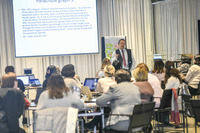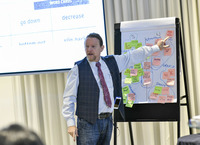Georgia
Georgia - CLIL Trainer CPD
CLIL for Integrated Curriculum SkillsThis article describes how the curriculum skills descriptors in the content subject areas can be used to a) provide a syllabus for the language classroom and b) act as a focus for integration and collaboration between subject teachers and language teachers.
1) Curriculum guidelines
Largely maligned as a burdensome chore, referring to curriculum documents can mean getting out the duster and wearing a face mask to avoid the sneezing. I appeal to colleagues to dust them off and get out a bright marker pen, prepare a cup of tea and read on. I’ve frequently made reference to curriculum guidelines during workshops with CLIL colleagues. My aim has always been that the curriculum guidelines are the go-to for understanding language demands of curriculum subjects.
![/userfiles/files/early%20sec%20science%20skills.jpg [/userfiles/files/early%20sec%20science%20skills.jpg]](/userfiles/files/early%20sec%20science%20skills.jpg)
Figure 1: Science skills
Figure 1 presents a summary of ‘thinking’ skills in the Malaysian junior science curriculum. Choosing some of the skills, we can take a look at the descriptors.
![/userfiles/files/0001_int-curr-skills-descriptors.jpg [/userfiles/files/0001_int-curr-skills-descriptors.jpg]](/userfiles/files/0001_int-curr-skills-descriptors.jpg)
Figure 2: Descriptors for science thinking skills
Classifying, and comparing and contrasting are two readily accessible skills in this science curriculum and the descriptors will make sense not just to science teachers. From this we can predict what the language is that learners will meet either in input media (text, video or other) or that the learner will be expected to produce either spoken or written.
Seeing this connection encouraged me to produce what I’ve titled ‘The Language Audit’ an alphabetical reference of curriculum skills with sample language. It’s a substantial document at 50 pages and growing with skills such as classifying, comparing and contrasting but also hypothesising, describing cause-effect relationships and much more. I was recently prompted to add ‘evaluating fact v opinion’ to this work and frequently add other skills and language as colleagues suggest a need for them. This is a work in progress which I share with participants in my trainings and conference workshops and talks.
I recently spent a week in Tbilisi with a group of 24 teacher trainers to offer them a CLIL Trainer CPD. The context of this meeting is that the government in Georgia is piloting what it has called an ‘Integrated Curriculum’ which expects teachers of the same grade learners to prepare and teach using a thematic curriculum. For example, the ‘environment’ sets teachers in the same grade to prepare all their lessons around this theme in the curriculum (among other themes). The point being that the teachers are expected to cooperate and teach lessons that are ‘joined up’. It’s a laudable initiative and one which has a secondary goal of offering teachers CPD in a system which has suffered from a range of challenges over recent years.
2) Soft CLIL trainer training for implementing the integrated curriculum
I prepared a 5-day programme of input on CLIL methods aimed at engaging pairs of teachers (most likely a language plus a subject teacher) in curriculum cooperation and this is something I have done for several years in Austria as part of COOP CLIL teacher development there. However, there are factors which are unique to Georgia that meant from the beginning of the trainer training meeting a change of perspective was necessary. Using content themes as a medium for teaching English as a foreign language, identifying curriculum academic language demands, techniques for guiding learners through curriculum input, and supporting learners in content production are some of the characteristics of CLIL seen as attractive potentially useful in improving methodology in schools in Georgia and presenting a clear focus for discussion regarding integrating subjects in the new curriculum. Unfortunately, at the time of writing there is very little opportunity for hard CLIL in Georgia, not having many if any teachers able to function in their subject areas through the medium of English as a foreign language. The new integrated curriculum IS thematic, but discussion with the trainers led us quickly to curriculum ‘skills’ as a focus for cooperation, as opposed to themes.
3) Overarching curriculum skills
![/userfiles/files/001_int-curr-skills-table.jpg [/userfiles/files/001_int-curr-skills-table.jpg]](/userfiles/files/001_int-curr-skills-table.jpg)
Figure 3: Table of overarching curriculum skills in curriculum guidelines in Georgia
Figure 3 shows a summary of the skill areas we identified during our week together. The column for curriculum links is blank with the example for Biology offering space for specific needs. It’s a framework for planning for cooperation. These skills came from the trainers working together in mixed subject groups with the instruction to consider aspects of their subject disciplines appropriate for cooperation in the integrated curriculum.
![/userfiles/files/0001_georgian-bio-skills.jpg [/userfiles/files/0001_georgian-bio-skills.jpg]](/userfiles/files/0001_georgian-bio-skills.jpg)
Figure 4: Descriptors from the Georgian Biology Curriculum
A Google translate gives us a useful understanding of one of the descriptors to be found in the Georgian Biology Curriculum: Development of research skills (observation, data analysis / presentation, argumentative reasoning, drawing conclusions).
Truth is that opening up the curriculum document (the more subjects, the better) will provide teachers with a focus for discussion of curriculum cooperation. Frequently, English teachers feel insecure when approaching content conepts, and feel ill-prepared to teach them. A good example in this very group is ‘velocity’ which was offered in this very question, ‘What do I do if I don’t feel confident to explain the concepts?’ The way I see it is that we need to move away from the expectation that language teachers deal with conceptual content like ‘velocity’ and much more. More valuable, achievable and effective is to focus on overarching curriculum skills like ‘data handling’ in the Biology curriculum.
By working on the skill of data handling and the subskills involved (observation, data analysis / presentation, argumentative reasoning, drawing conclusions) a teacher of English can practise the SAME skills needed in several other subjects. Data handling occurs across the content curriculum at many grade levels. What the English teacher needs is accessible conceptual content. A very accessible area of content for the English classroom for practising data handling would be ‘Eating and drinking habits’ (1-see endnote for a resource describing data handling through the theme ‘Eating and drinking habits’) where the class surveys (observes) daily habits and behaviour in this area, gathers data, analyses and presents the data, gives argumentative reasoning while interpreting and drawing conclusions. These skills, while practised in a foreign language, are immediately transferable to Biology lessons (Maths, Geography etc).
What is needed is coordination so that teachers are a) aware of these overarching skills, and b) can see when they are taught in the curriculum so they can plan for integrated lesson teaching involving the English lessons.
Initially, during the CLIL Trainer CPD, the trainers were led by themes they agreed to work on together as shown in Figure 5.
![/userfiles/files/0001_initial-themes.jpg [/userfiles/files/0001_initial-themes.jpg]](/userfiles/files/0001_initial-themes.jpg)
Figure 5: Curriculum themes for cooperation
The subheadings in the curriculum themes reveal skills which occur in the themes and there are clearly skills which are recycled, cause-effect, process description, characteristics, dealing with with data and others. Seeing these skills encouraged us to investigate the curriculum guidelines further. Figure 4 includes an excerpt from the Biology curriculum referring to ‘data handling’ and the subskills this includes (gathering data, graphing data, interpreting and presenting results and conclusions).
4) Skills for cooperation on the integrated curriculum
With the realisation that the overriding curriculum skills should be the focus for cooperation (as opposed to CLIL with the lack of ‘hard’ CLIL teachers available) discussion focussed intensively on developing sample teaching materials in the theme areas to develop and practice the curriculum skills and making decisions about the role of the language teachers and the role of the subjec teacher.
The question did arise as to what the benefit is for the language teachers and the subject teachers. Most obviously, focusing on curriculum skills and adopting a CLIL approach helps language teachers teach their subject more meaningfully. We move away from a lexico-grammatical curriculum loosely embedded within made-up textbook ‘real-life’ themes to a language curriculum based around curriculum skills which connect with the real lives of the learners’ themselves. A focus on the curriculum skills is transparently useful for subject teachers because this can only consolidate what the are trying to teach in their curriculum subject area. Curriculum skills for the integrated curriculum helps both groups of teachers teach their subjects.
5) Three dimensions of CLIL
Language skills, procedural skills and conceptual skills make up the three pillars of the CLIL approach (Ball, Kelly & Clegg, 2015). The Georgian context of curriculum development and educational reform may not be ready for CLIL as yet, but by exploring the ‘procedural’ dimension (and the thinking they entail) with teachers and facilitating discussion about curriculum descriptors and the meanings attached to the skills listed, this will go some significant way to improving teaching and learning. It also prepares the ground further down the line for forms of CLIL to be tried out (with the proviso that graduates with ever increasing levels of English proficiency are coming out of the universities, and teachers are offered and take opportunities to improve their own levels).
6) Soft CLIL Trainer CPD Follow–Up
The trainers were given homework to do. They will write up and finish their sample integrated curriculum resources and place them within a framework for the first two-day training for ‘curriculum skills for cooperation’ for meetings with (20 teachers 10 subject and 10 language).
My role will be to offer support and suggestions online, by mail, Skype, Zoom and as the workshops are delivered and teachers prepare and deliver their integrated lessons, I will receive feedback, observations and hope to contribute to the ongoing growth of Georgia’s integrated curriculum approach making the most of what CLIL has to offer.
One last word on this initiative. It is the first time in my 25 years working in CLIL that I’ve been asked to work with a mixed group of teacher trainers with a specific focus on writing a draft of a Soft CLIL curriculum and which offers sample lessons and materials for English teachers interested in and with the aim of developing cross-curricular skills. I have to congratulate Georgia for their insight, it’s a very valuable approach to developing collaboration through the curriculum.
Endnotes
1 – data handling
There is an article on this area with lots of ideas for both English and subject teachers on the FACTWorld site:
Thinking Skills for Successful Skill
Data handling also appeared in one of the Café CLIL discussions:
https://www.factworld.info/en/Cafe-CLIL-Discussion-12
PS - I've prepared this as a pdf, should it be useful, download here.







